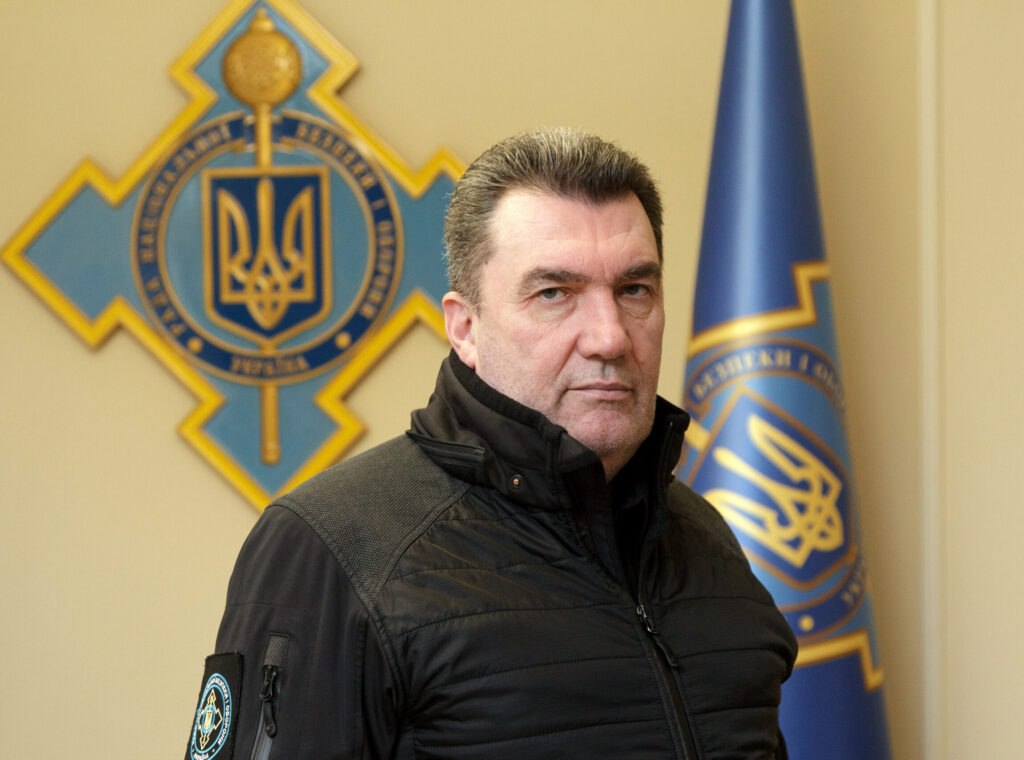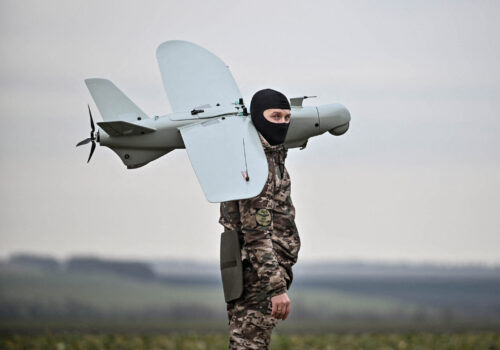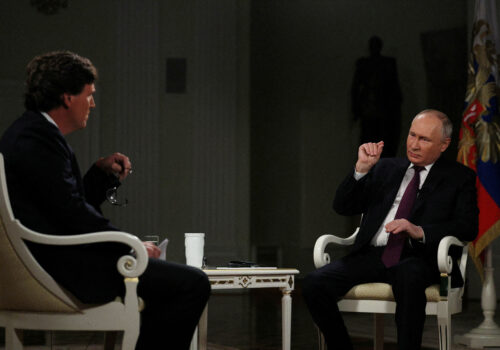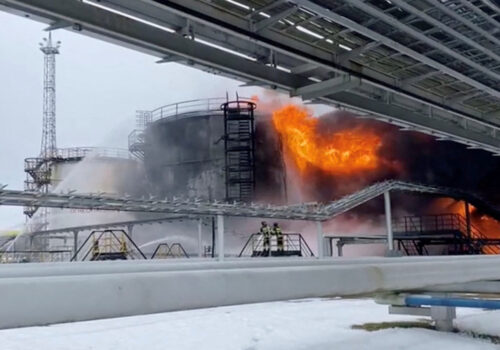When the full-scale Russian invasion of Ukraine began in February 2022, Ukrainian Security and Defense Council Secretary Oleksiy Danilov found himself having to repeatedly reassure Ukraine’s doubting partners that the country was not about to collapse. “At the beginning of the war, nobody believed we would stand,” he recalls.
Danilov says the lack of faith he encountered among Ukraine’s allies during the first days of the invasion reflects the widespread disinformation that continues to cloud international perceptions of his country’s struggle against resurgent Russian imperialism. With the invasion now in its third year, Danilov warns that many in the West remain in denial over the scale of the threat posed by Putin’s Russia, and have yet to grasp the true international implications of the war in Ukraine.
Stay updated
As the world watches the Russian invasion of Ukraine unfold, UkraineAlert delivers the best Atlantic Council expert insight and analysis on Ukraine twice a week directly to your inbox.
Danilov has led Ukraine’s influential National Security and Defense Council since October 2019, and has been at the heart of Ukrainian attempts to galvanize international opposition to Russia’s invasion. He readily admits that these efforts have been consistently hampered by Russia’s sophisticated and highly effective disinformation strategies. Looking back at the past two years, Danilov says this experience has underlined the growing importance of information warfare in shaping today’s multidimensional battlefield. “We all make decisions based on the information we have. While there is now an unprecedented amount of information available, it is also apparent that this information can be easily manipulated and distorted.”
Today’s increasingly chaotic and overloaded information landscape is helping Russia conceal its true intentions in Ukraine and disguise its geopolitical ambitions, says Danilov. He frames the ongoing invasion of Ukraine as the central stage in a far broader global confrontation between the democratic world and the resurgent forces of autocracy led by Russia, China, Iran, and North Korea, but cautions that such clarity is often lacking during his interactions with Ukraine’s Western partners.
The 61-year-old Ukrainian Security Council Secretary bemoans the absence of a modern-day Reagan or Churchill with the necessary vision to see the Russian threat in its true historical context. Unless today’s generation of Western leaders urgently acknowledge the scale of the challenge, he predicts they will soon be confronted by a very different and more hostile international environment. “Too many countries remain stuck in an information fog and do not realize that World War III is already underway. The whole world is engaged in the current war in one way or another, even though Ukraine is the only country doing the actual fighting against Russia.”
Eurasia Center events

With no end in sight to Russia’s invasion, the diplomatic debate in many Western capitals currently revolves around the question of Vladimir Putin’s ultimate war aims and how far he is prepared to go. To Danilov, the answer is disarmingly simple: Putin wants to completely transform the geopolitical climate and will keep going until he is stopped. If Ukraine should fall, Danilov is convinced Russia will expand its aggression further. He believes the countries most immediately at risk will be the former member states of the Warsaw Pact. “Putin made his intentions perfectly clear in his December 2021 ultimatum to the West, when he called for NATO to withdraw from Central and Eastern Europe. Just look at the map; it’s all there.”
Returning to the status quo of the early 1990s is unlikely to satisfy the Russian dictator, Danilov says. He argues that Putin’s foreign policy objectives ultimately stretch far beyond the old Iron Curtain and include the breakup of the European Union itself. This would allow Putin to divide and conquer Europe. “One of Putin’s key goals is the destruction of the EU. It is very difficult for the Kremlin to deal with a united Europe; this puts Russia at a significant disadvantage. Putin would much prefer to splinter the EU and negotiate with each European country separately.”
This does not mean Russia is preparing to imminently invade Belgium or occupy Brussels, of course. On the contrary, the Kremlin is far more likely to employ the kind of hybrid warfare tactics honed in Ukraine between 2014 and 2022. Indeed, Danilov argues that Moscow has been engaged in an active campaign of hybrid hostilities inside the European Union for a number of years, and accuses European leaders of turning a blind eye to this unwelcome reality. “Russia’s hybrid war against the EU is already well underway, but some Western countries prefer not to acknowledge it. Putin constantly commits acts of hybrid aggression against Europe, but many Europeans are reluctant to draw the obvious conclusions as this would force them to recognize the threat and respond.”
Putin’s other great strategic priority is the dissolution of NATO. While skeptics argue that the Russian military is currently in no shape to take on NATO, Danilov believes Putin could potentially achieve his goal by discrediting the alliance rather than defeating it in a conventional war. With Western weakness increasingly evident in Ukraine, Putin may seek to test the shaky resolve of NATO leaders by staging some kind of border provocation. According to Danilov, if the alliance fails to produce an adequate response, there is a very real chance that member countries will quickly lose faith in collective security and seek alternative arrangements. NATO may be able to formally survive such a blow, but the damage to its credibility would be fatal. “When you have a maniac on the loose in your neighborhood, the task is to stop him as soon as possible and not engage in negotiations or other nonsense,” Danilov says.
Based on his own extensive interactions with NATO commanders over the past two years, Ukraine’s Security Council Secretary has full confidence in the alliance’s military leadership and believes they are under no illusions regarding both the nature of the Putin regime and urgency of the threat facing the West. However, he also stresses that the same cannot necessarily be said for Europe’s political leaders. This is a recipe for potential disaster, says Danilov. “Putin is the Hitler of our era. The current situation is strikingly similar to the 1930s, when military men warned of the mounting danger but were overruled by politicians who preferred to appease Hitler. If we make the same mistake again, it could mean the eclipse of the West.”
Peter Dickinson is editor of the Atlantic Council’s UkraineAlert service.
Further reading
The views expressed in UkraineAlert are solely those of the authors and do not necessarily reflect the views of the Atlantic Council, its staff, or its supporters.

The Eurasia Center’s mission is to enhance transatlantic cooperation in promoting stability, democratic values and prosperity in Eurasia, from Eastern Europe and Turkey in the West to the Caucasus, Russia and Central Asia in the East.
Follow us on social media
and support our work
Image: Secretary of the National Security and Defense Council of Ukraine Oleksiy Danilov pictured in Kyiv.




